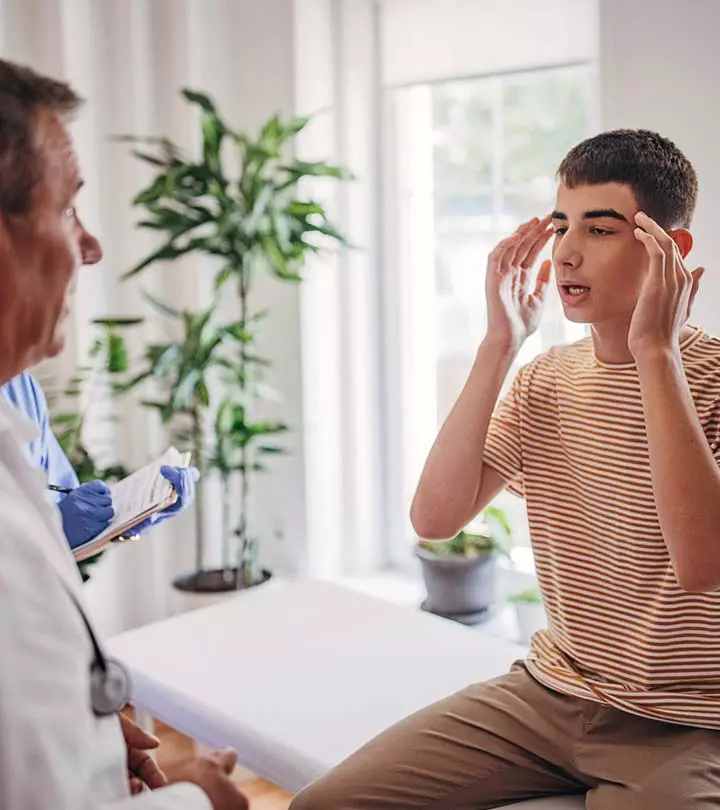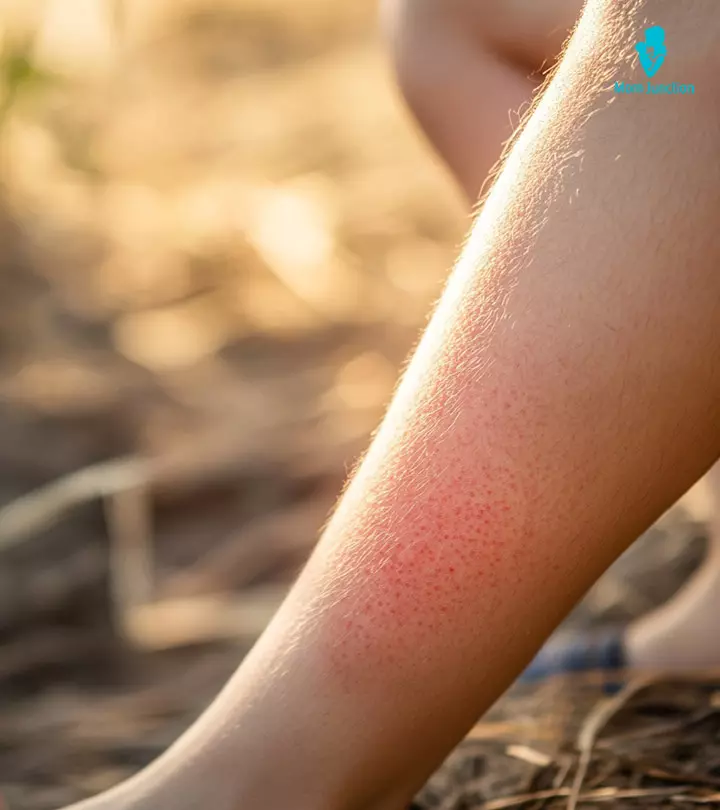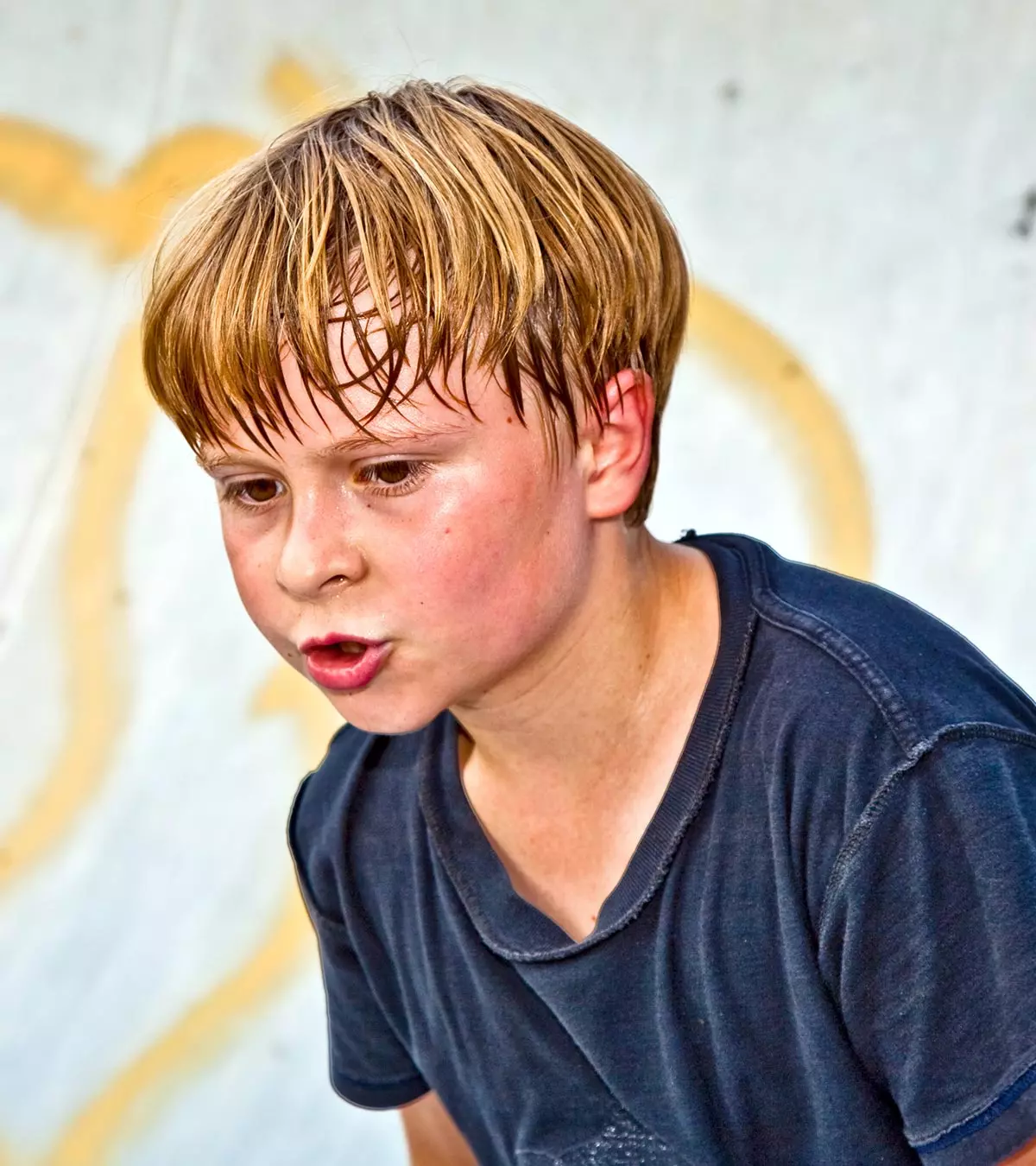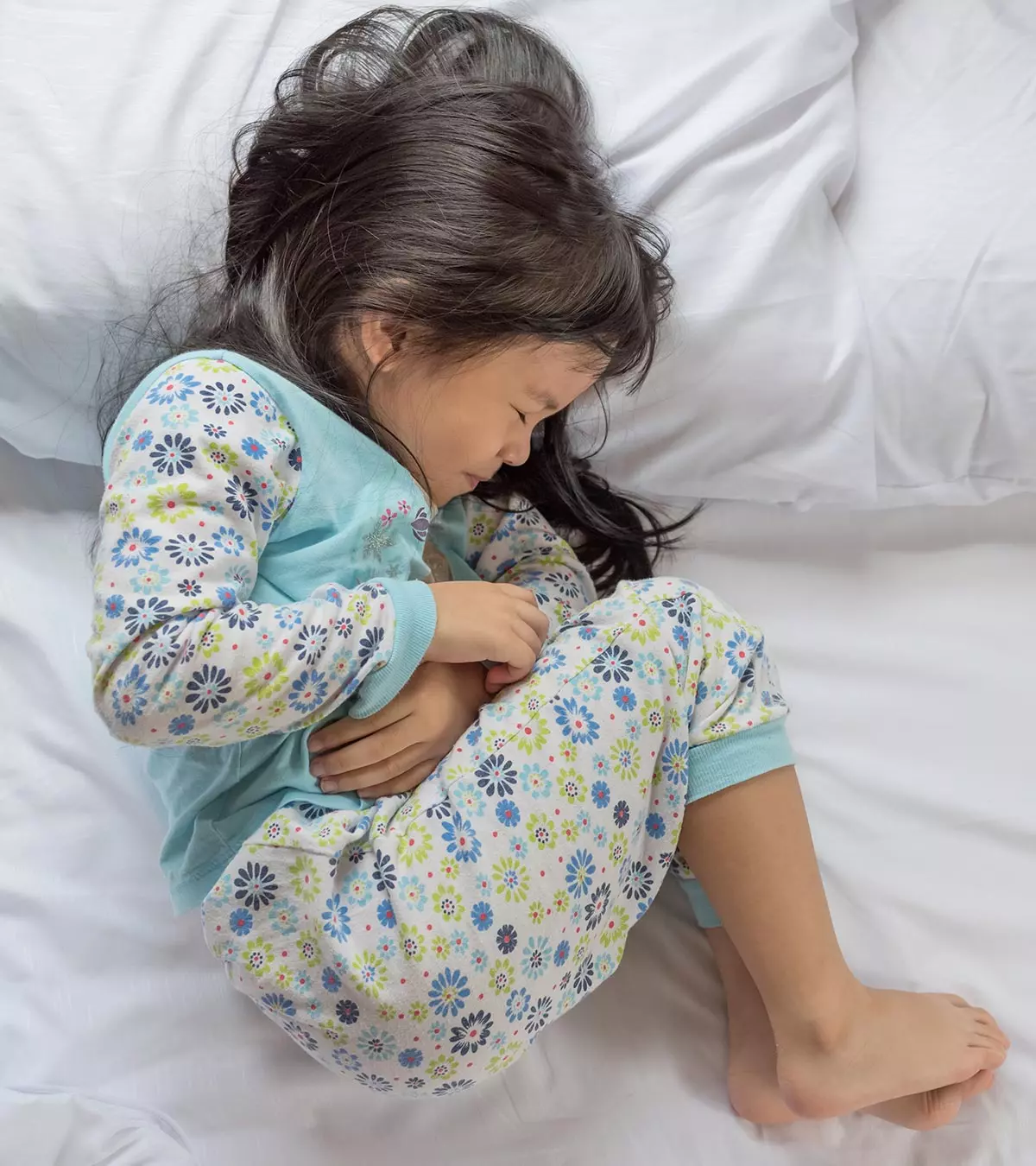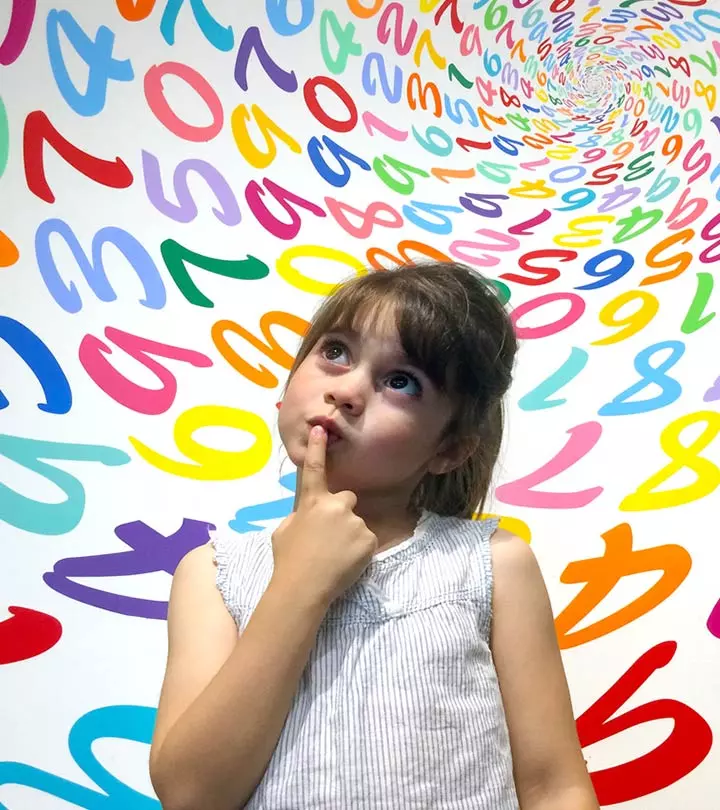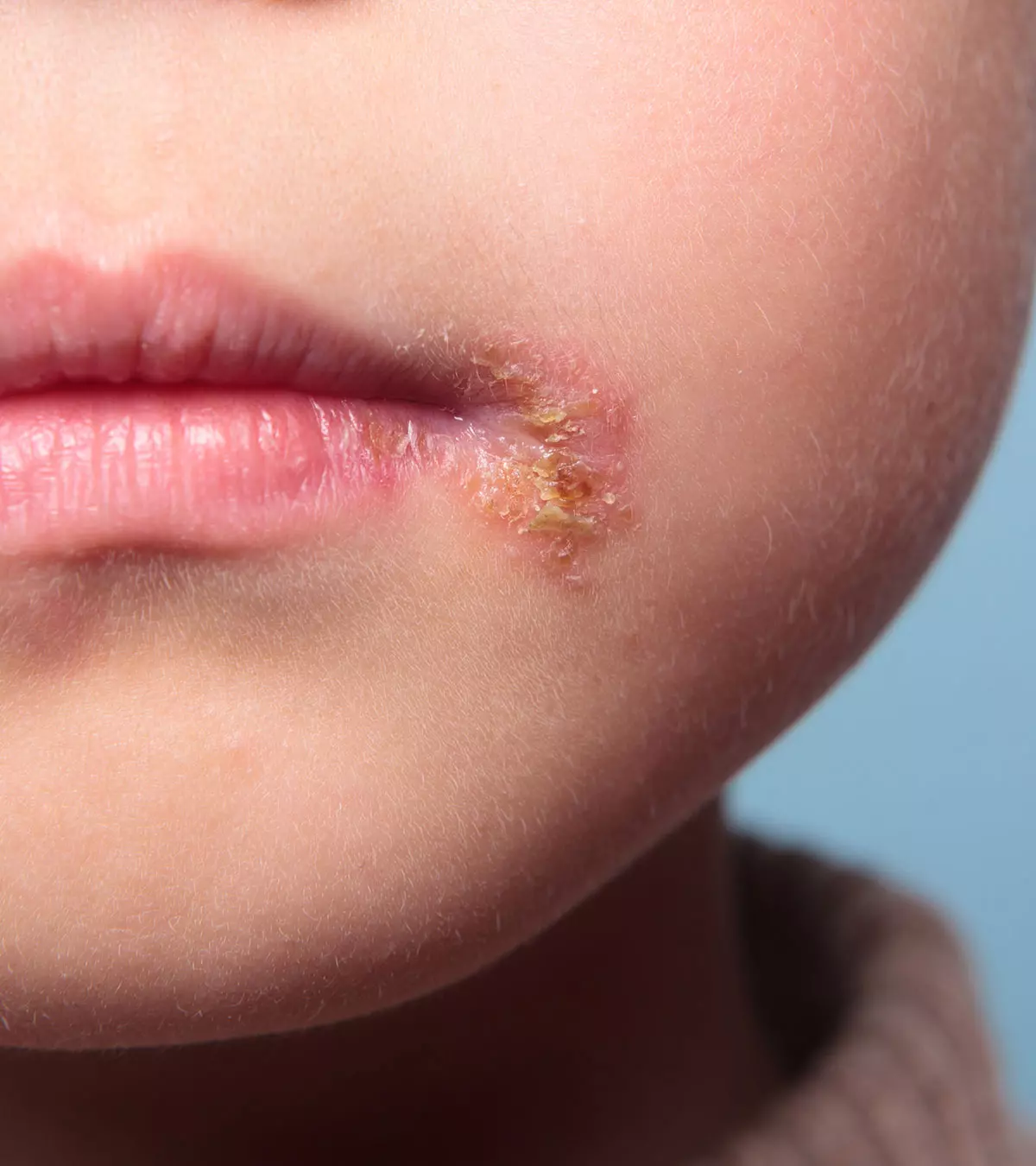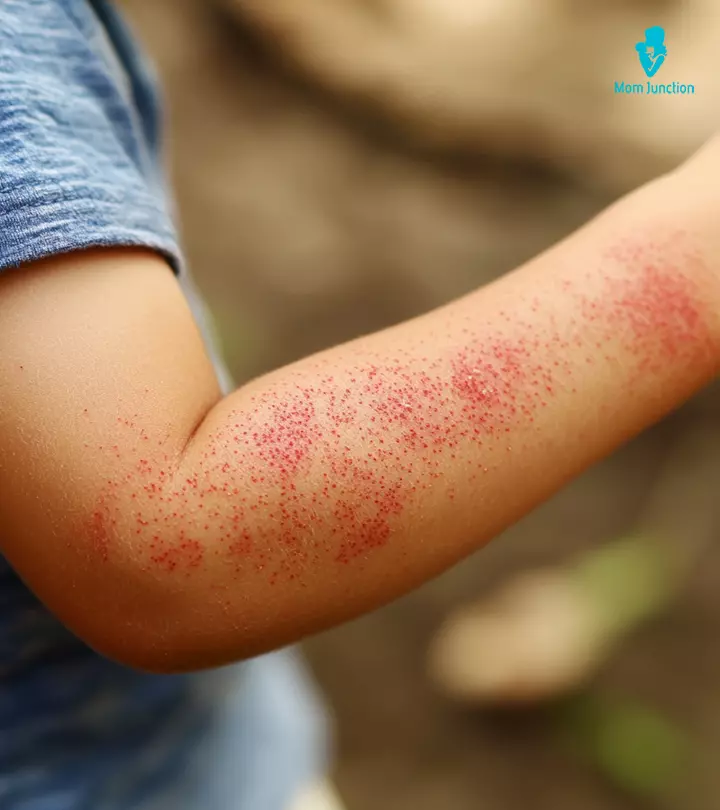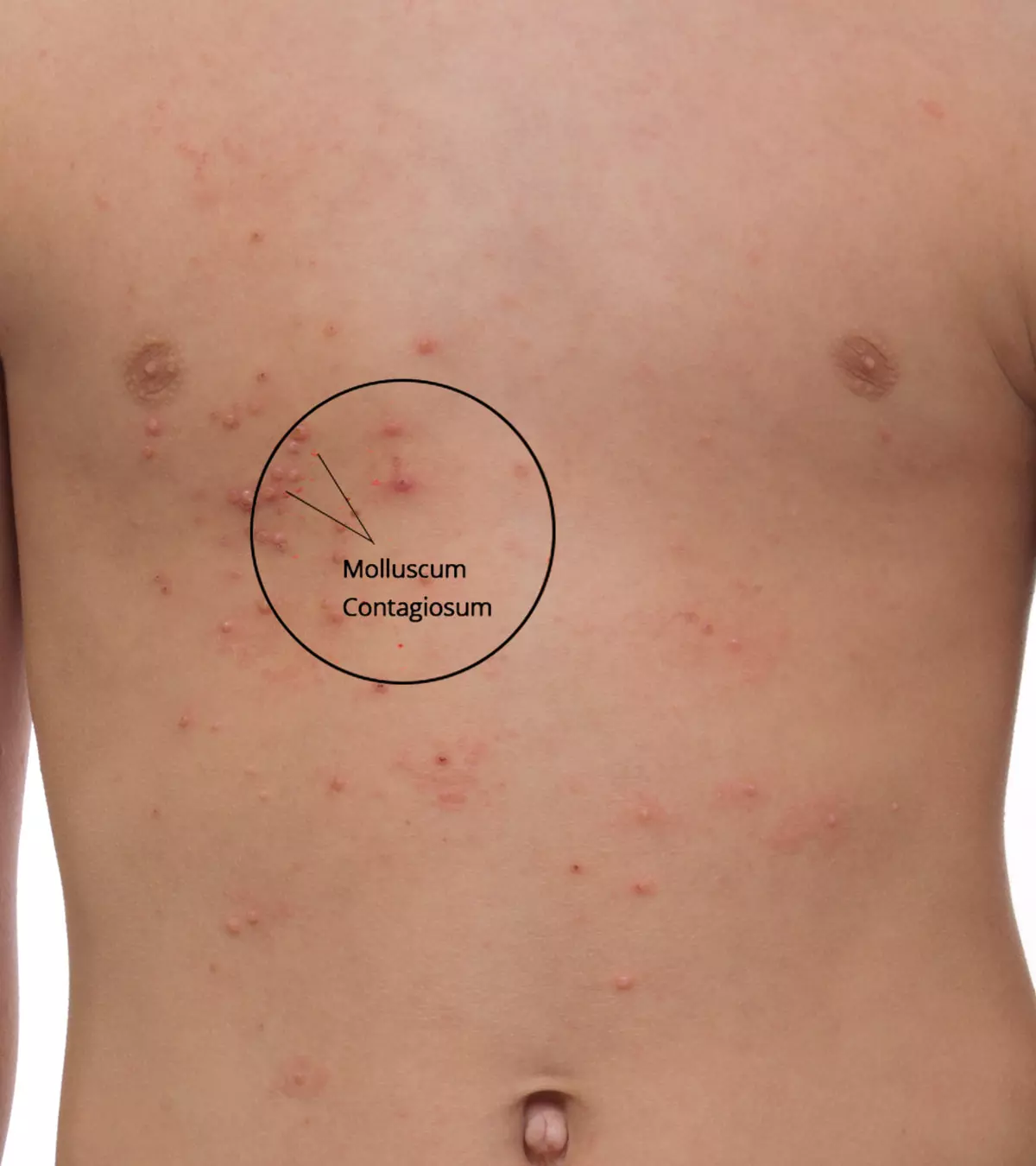
Image: Shutterstock
Muscle twitches in children are sudden, uncontrollable muscle movements or jerks in their bodies. Muscle twitching, also known as myoclonus, could be repetitive and triggered by certain factors and postures. Muscle twitching is not a disease, but it could indicate various underlying conditions in the brain and nervous system. Twitches may occur in a single muscle or multiple muscles at a time. In addition, multiple muscle twitching might occur in the areas of the body involving nerves that serve common muscles. This condition can be managed in children by modifying their diets or sleep patterns. First, however, you should contact a healthcare provider who might evaluate the underlying causes of twitching and suggest suitable interventions to avoid future complications. In this post, explore the types, possible causes, symptoms, diagnostic tests, treatment options, and preventive strategies for muscle twitches in children.
Twitches may occur in a single muscle or multiple muscles at a time. In addition, multiple muscle twitching might occur in the areas of the body involving nerves that serve common muscles.
This condition can be managed in children by modifying their diets or sleep patterns. First, however, you should contact a healthcare provider who might evaluate the underlying causes of twitching and suggest suitable interventions to avoid future complications.
Explore more about the types, possible causes, symptoms, diagnostic tests, treatment options, and preventive strategies for muscle twitches in children in this post.
Key Pointers
- Epilepsy disorders and dehydration are significant causes of muscle twitching in children.
- Electromyography, electroencephalography, imaging tests, and blood tests, including electrolyte measurements, may help identify the cause of muscle twitching.
- Muscle twitching is treated according to the cause, and long-term medications are often required for children with epilepsy disorders and seizures.
Types Of Muscle Twitches (Myoclonus) In Children
There are two basic types of muscle twitches (1).
- Positive myoclonus, which causes contraction of a muscle or muscle groups.
- Negative myoclonus, a sudden uncontrollable or involuntary muscle relaxation (hand-flapping tremor). Sudden muscle relaxation may cause a walking or standing person to fall.
The following types of myoclonus are seen in children based on the underlying cause and triggers (2).
- Essential myoclonus is stable (unchanged) over time, and there is no known underlying cause.
- Opsoclonus myoclonus, also known as dancing eyes-dancing feet syndrome, is a rare condition where rapid, irregular eye movements are seen with muscle spasms. This may often occur due to other conditions, such as viral fevers and tumors. The annual incidence of opsoclonus is one in five million children (13).
- Action myoclonus occurs when the child moves or tries to move. It is the most severe type, since the muscle spasms may disable arms, face, legs, and voice.
- Stimulus sensitive myoclonus is triggered by an external stimulus such as light, noise, or body movement or a specific body position.
- Physiological myoclonus occurs in healthy individuals and is not a cause of concern. Hiccups and getting shakes or spasms when the child is anxious or worried are some examples (14).
Most individuals experience myoclonus at some point in life and many experience it during childhood and teenage years. A questionnaire survey of 539 healthy individuals was conducted and it was revealed that about 70% of them experienced fasciculations (involuntary muscle twitches) before the age of 20 (15). It is essential to understand the cause and triggers of muscle twitching in children to eliminate it. Knowing about the type of muscles affected during the myoclonus episode is vital for evaluating the condition’s severity.
Causes Of Muscle Twitches In Children
The exact cause of muscle twitching is not well understood. An abnormal electrical impulse from parts of the central nervous system (CNS) such as the brain stem, cortex, or nerves to the muscle or a group of muscles causes muscle twitches. Damage to the peripheral nerves (nerves outside CNS) supplying muscle fibers may also cause myoclonic episodes.
The following conditions can be a reason for muscle twitches in children (3) (4) (16).
- Head injuries
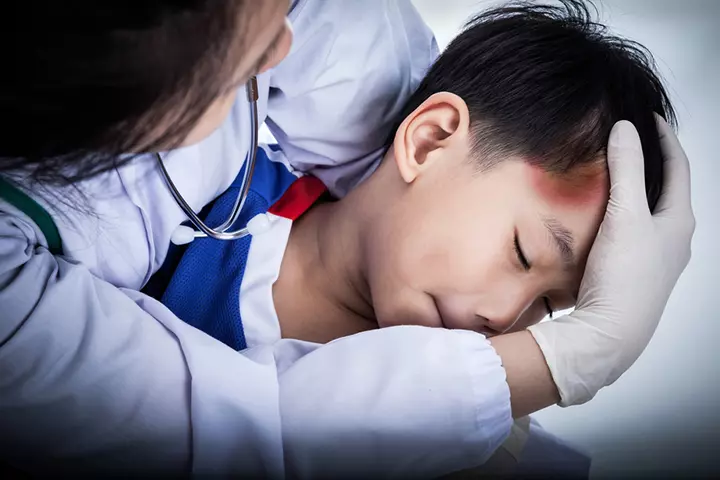
- Birth hypoxiaiSerious health condition in which the baby does not receive ample oxygen before, during, or immediately after birth
- Genetic disorders
- Spinal cord injuries
- Epilepsy disorders
- Brain tumors
- Liver failure
- Kidney failure
- Hypoxia (lack of oxygen)
- Mental disorders
- Nerve damages
- Stress
- Lack of sleep
- Dehydration
- Poor nutrition intake
- Caffeine

- Side effects of certain medications
- Hormonal imbalances
- Certain chemicals
- Dystonia
- Other injuries may also cause temporary muscle twitches and spasms in children. Emily Neu, a mother of six, shares about the time her youngest child (JT) fell from the bar stool at the kitchen counter and broke his femur from the knee area to close to the hip. Documenting the ride to the hospital with her son, she says, “Throughout the ride in the ambulance to the hospital, JT would seem to relax a bit and then twitch horribly and start to cry in pain. The paramedics said she felt that he was having some muscle spasms because as he would try to relax, the muscles would tighten up because they were trying to hold onto the bone, etc. The spasms and cramps continued throughout the entire time we were waiting for the cast (spica cast) (i).”
Conditions or diseases affecting the neural mechanism of muscular control may also lead to abnormal muscle movements. Children with frequent muscle twitches may require detailed analysis to identify and treat the underlying cause.
 Quick fact
Quick factSymptoms Of Muscle Twitches In Children
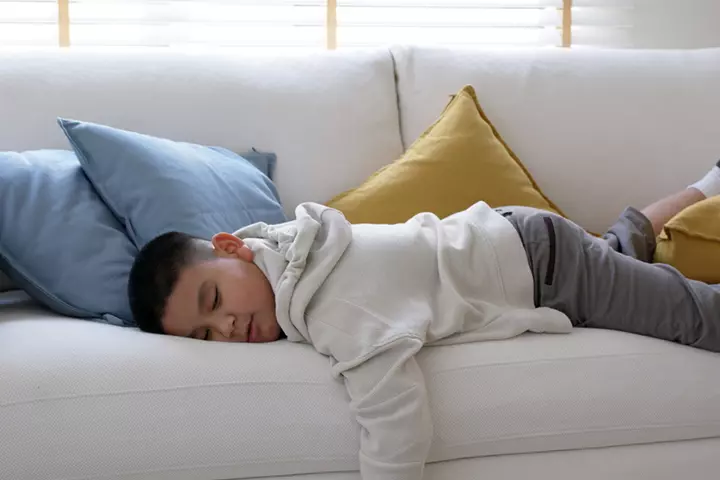
The following symptoms are often seen in children with myoclonus (5) (6).
- Poor muscle tone
- Tight muscles
- Tiredness
- Irritability
- Tingling sensation
- Muscle becomes smaller
- Numbness
- Uncontrolled, jerky muscle movements
- Clumsy movements
- Poor body balance
- Motor tics
Some children may also show behavioral changes such as irritability, anxiety, and reluctance to participate in activities due to fear of twitching episodes. The signs and symptoms may vary depending on the underlying cause. A doctor may look for the muscles involved and triggers to diagnose the condition.
Seek immediate medical care if you see your child twitching for more than two weeks, have muscle twitches at multiple places, or if your child complains of weakness or stiffening of the affected muscles. Get a doctor’s help if you have observed twitches in your child after taking any prescribed medication. A doctor may look for the muscles involved and triggers to diagnose the condition (17).
Diagnosis For Myoclonus In Children
The pediatrician takes a detailed medical history to understand the overall health of the child. They will ask about the signs and symptoms, possible triggers, the muscles involved, duration of twitching, etc, to identify the possible causes and types of myoclonus.
According to the basic evaluation, more tests are ordered to confirm the underlying causes. These tests may include (7):
- Electromyography to assess the muscle activity in response to electrical impulses
- Electroencephalograph (EEG) to evaluate the electrical activity of the brain

- Imaging tests such as MRI, CT, PET scan, etc., to identify brain pathologies, such as tumors
- Nerve conduction studies
- Blood tests to look for certain genetic conditions, viral infections in children, etc.
The pediatrician will evaluate the results of the test to identify the underlying causes and begin appropriate treatment.
Treatment For Muscle Twitches In Children
The treatment options may vary depending on the cause of the neuromuscular disease. If the reasons are not identifiable on examination, symptom-relieving medications are prescribed to manage the condition. These may include the following options (8). Most are neurological drugs that help relax the nervous system or nerves. The possible treatments for muscle twitching in children include (8) (18):
- Drugs such as sedatives, tranquilizers (clonazepam), or anticonvulsants may be prescribed.
- Boys may receive treatment with anticonvulsants, such as valproic acid (Depakene). Valproic acid may cause side effects such as polycystic ovarian diseaseiA condition where the female body produces increased male hormone resulting in multiple cysts in the ovaries and weight gain in girls. Thus, girls may receive lamotrigine (Lamictal) for treating myoclonus.
- Topiramate (Topamax), levetiracetam (Keppra), and zonisamide (Zonegran) are other anticonvulsants of choice for treating muscle twitches.
- Sedatives such as barbiturates could reduce muscle twitches since they decrease brain activities.
- Treatment of the underlying cause.
Janet, an author, blogger, and a mother of a son with severe obsessive-compulsive disorder (OCD), shares about her son’s twitching episodes. She says, “When my son Dan’s obsessive-compulsive disorder was at its worst, he developed facial contortions, or twitching, as well as some noticeable tics. As if having severe OCD wasn’t frightening enough!” She further shares, “Dan’s twitching intensified when he was taking atypical antipsychotic medication, and he developed jerky movements as well. Combine this with tremors and a non-stop bouncing leg, and it was tough to see him in this condition.” Talking about managing the condition, she says, “Thankfully, I’m happy to report that in Dan’s case, his twitching, tics, and all movement issues resolved once his OCD was treated, and he was off all his medications. But it took a while (ii).”
- Surgical removal and chemotherapy for tumors could improve twitches if it is the cause.
- Behavioral therapy may be initiated if a lack of sleep is the cause.
- If the episode is triggered by light, movement, etc., it is recommended to avoid triggers as much as possible.
 Point to consider
Point to considerDepending on the severity and cause, the doctor may prescribe medications or procedures. Some conditions are curable with treatment, whereas few cases may require long-term management.
Home Care For Muscle Twitches In Children

Muscle twitching caused by certain lifestyle triggers can be managed with home remedies. These may include (9) (17):
- Eat healthily
- Get good sleep
- Avoid caffeinated beverages, such as energy drinks, coffee, etc.
- Stay hydrated
- Exercise regularly
- Try to keep anxiety and stress at bay
- Take enough rest
- Try relaxation methods, such as listening to music, meditation, etc.
- Use dim lights if light triggers muscle twitches
- Stretch and massage the muscles where twitches are occurring
You may discuss with a pediatrician if the muscle twitches don’t get well with home care measures. Seek medical care for detailed analysis and follow home care measures if modifiable lifestyle factors are causing twitches.
Muscle twitches in children are involuntary movements that could be triggered either due to dehydration or an underlying cause of epilepsy. Therefore, it is advised to keep a check on the factors that induce these cramps in children and consult the doctor for a confirmed diagnosis. The doctor might either provide medicines to control the symptoms or other medications depending upon the cause of the condition. However, you must ensure that your child gets enough sleep, eats healthy, and stays protected from any triggers.
Frequently Asked Questions
1. When should I worry about muscle twitching?
It is advised to consult a doctor if you notice frequent muscle twitches that affect your ability to work at a normal pace, accompanied by headaches and seizures (1).
2. Is it normal to experience muscle twitching every day?
Frequent muscle twitching may be due to non-serious underlying factors. However, consult a medical professional/pediatrician to rule out any serious underlying issues.
3. What is a muscle twitch, and how is it different from a spasm or cramp?
A muscle cramp is a painful involuntary tightening of the muscles of a particular body part which may not relax on its own, while a muscle twitch is an involuntary tightening or relaxation of muscles in the body that may not be readily noticeable and may resolve on its own (3) (11).
4. At what age do muscle twitches in children typically occur?
Muscle twitches, in the form of spasms, typically commence between three to twelve months and may persist for a few years (12).
5. Can muscle twitches in children affect their ability to participate in physical activities or sports?
Anecdotal evidence suggests that muscle twitches generally do not affect the child’s ability to participate in physical activities. However, if the child has an underlying condition, it may interfere with their activity levels.
Infographic: Does Amyotrophic Lateral Sclerosis (ALS) Start With Muscle Twitches?
Amyotrophic lateral sclerosis, or ALS, is a progressive neurological disease often caused by genetic factors. In this condition, there is a loss of motor neurons, leading to poor muscle control and movement. Initial symptoms of ALS may include muscle twitching. Although rare, this can affect children. Go through the infographic to know more about muscle twitches in ALS. Illustration: Momjunction Design Team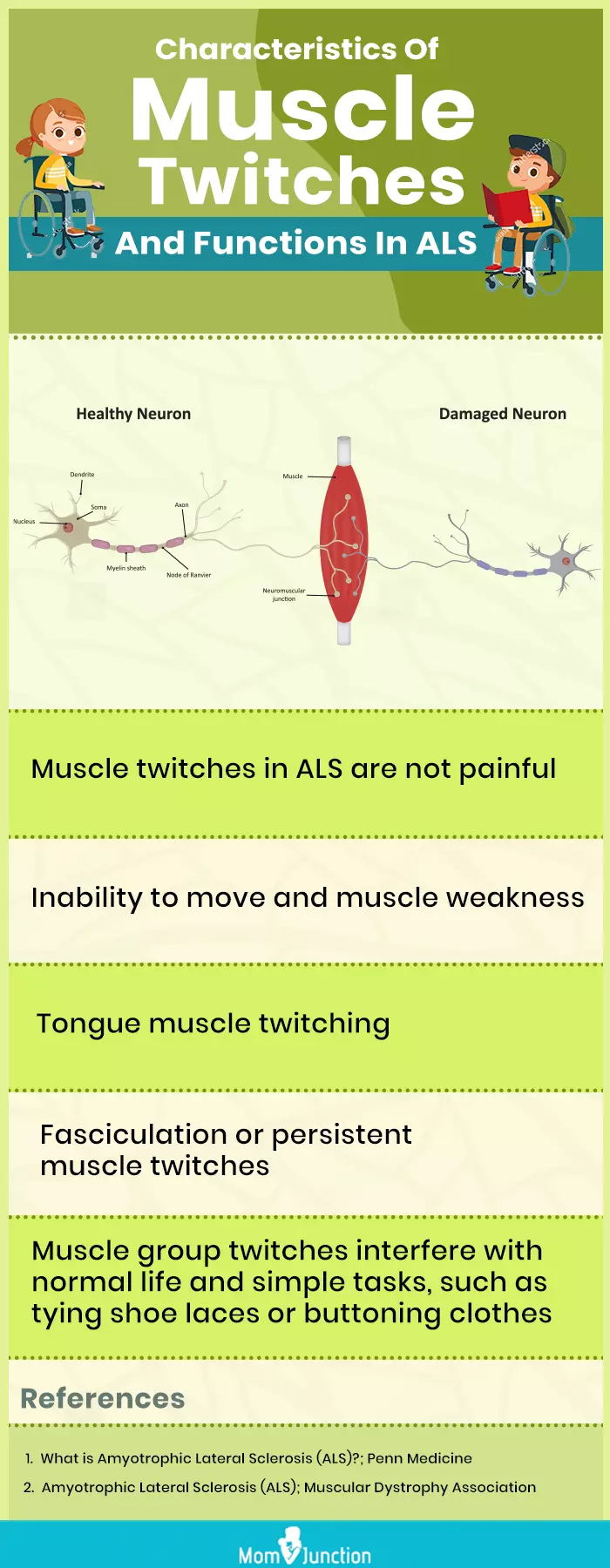
Illustration: What Causes Muscle Twitches In Children And How To Stop It?
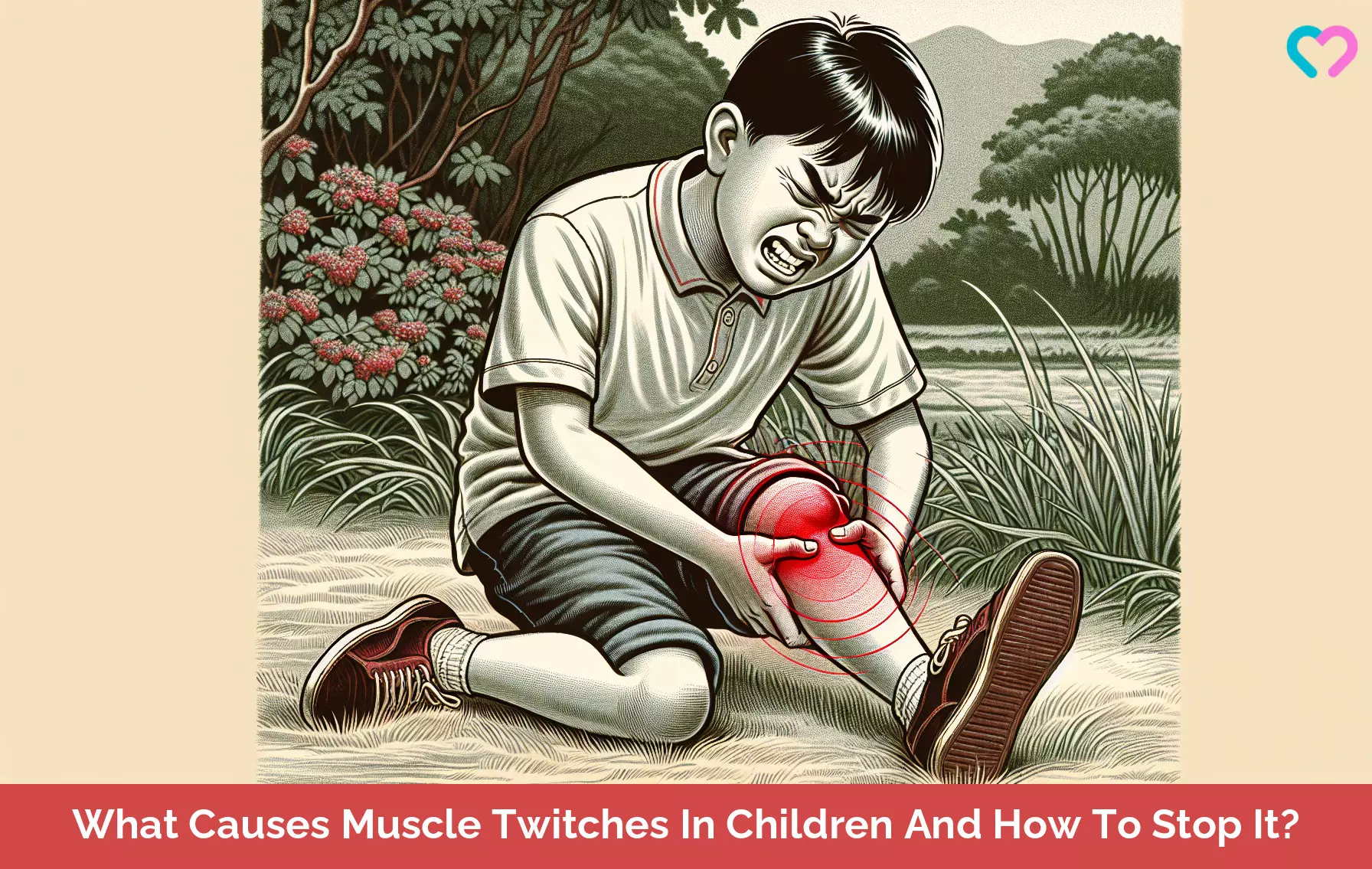
Image: Dall·E/MomJunction Design Team
Muscle twitching and fasciculation can be normal, but when should you worry? Find out in this video!
Personal Experience: Source
MomJunction articles include first-hand experiences to provide you with better insights through real-life narratives. Here are the sources of personal accounts referenced in this article.
i. The green monster – life in a spica cast;
https://lifeinaspicacast.blogspot.com/2014/02/
ii. OCD, Tics, and Tourette Syndrome;
https://ocdtalk.wordpress.com/2015/03/29/ocd-tics-and-tourette-syndrome/
References
1. Muscle Twitch (Myoclonus); Cleveland Clinic
2. Myoclonus Fact Sheet; The National Institute of Neurological Disorders and Stroke
3. Muscle Twitching; MedlinePlus; The United States National Library of Medicine
4. Myclonus; Bayer Medicine
5. What Causes Muscle Twitches?; Johns Hopkins All Children’s Hospital; Johns Hopkins Medicine
6. Myoclonic Epilepsy; Cedars Sinai
7. What You Need To Know About Muscle Twitching?; Medindia
8. John N. Caviness; Treatment of Myoclonus; The United States National Library of Medicine
9. Why do my muscles twitch?; Wexner Medical Center; The Ohio State University
11. Muscle cramps; National Library of Medicine
12. Myoclonic Seizures; Johns Hopkins Medicine
13. Edward Margolin and Trishal Jeeva-Patel; Opsoclonus; NIH (2022)
14. Myoclonus; Mayo Clinic
15. Hyoung Won Choi; Fasciculations in Children; Pediatric Neurology (2021)
16. Myoclonus; National Institutes of Health (NIH)
17. Twitching eyes and muscles; NHS18. Myoclonus Diagnosis; Mayo Clinic
Community Experiences
Join the conversation and become a part of our nurturing community! Share your stories, experiences, and insights to connect with fellow parents.
Read full bio of Dr. Mubina Agboatwalla
Read full bio of Dr Bisny T. Joseph
Read full bio of Swati Patwal
Read full bio of Anindita Ghatak





